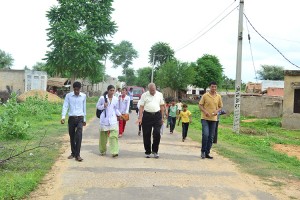 Bhagwati Agrawal was a successful engineer working in the US with Fortune 500 Companies. Having grown up in Rajasthan, India, he and his friends in the US always ensured that they sent donations back home whenever there was need.
Bhagwati Agrawal was a successful engineer working in the US with Fortune 500 Companies. Having grown up in Rajasthan, India, he and his friends in the US always ensured that they sent donations back home whenever there was need.
Agrawal’s career had been successful until 2003, when his company declared bankruptcy. “I was thinking of starting a new venture and invited my friends over to discuss it,” recalls Agrawal. This meeting of friends would prove to be a turning point in Agrawal’s life.
He and his friends were discussing the drought in India and how they had all donated money to help with the efforts back home. “It wouldn’t make a difference even if we donated $100 million,” said one of his friends. Agrawal realized the truth in this statement. “I decided there and then to find a sustainable solution,” recalls Agrawal.
Rivers from the sky
To the residents of Rajasthan, water scarcity is a normal part of life. Women and children in the region walk for miles to get water. Dishes are cleaned using sand to conserve the precious resource. However, the problem has escalated in the past few years.
Agrawal founded the nonprofit, Sustainable Innovations, which created an innovative rain water harvesting system that currently supplies drinking water to more than 10,000 residents of six villages. The system however, is not your regular rainwater harvesting system. It consists of a network of rooftops, pipes and gutters connection to underground reservoirs. This earned it the name Aakash Ganga (River from the Sky).
“When I started out, I realized that there was more to rainwater harvesting than simply collecting rain water,” says Agrawal. “We had to find a way to ensure that the water we collected was distributed to residents fairly. We wanted to reach every segment of the society we were targeting. This system is designed to reach the entire community.”
Life giving water
Bringing water to the villages has had many positive effects. The women and children don’t have to walk miles to fetch water. As a result, the women are now more economically productive and school attendance rates have risen especially amongst girls. Famers claim that their cows are now producing double the volume of milk than before they had access to the extra water. In addition, cases of waterborne diseases have been reduced.
“I used to have pains in my body,” says Haringar resident Rotash Varma, 56. “When the sweet water became available through Aakash Ganga, I don’t suffer any more body problems.”
Agrawal is not done yet. “I’m 70 now,” he says. “I have maybe 10 active years left. I feel like Usain Bolt now. I will sprint to accomplish my mission of bringing clean water to villages around the world.”
